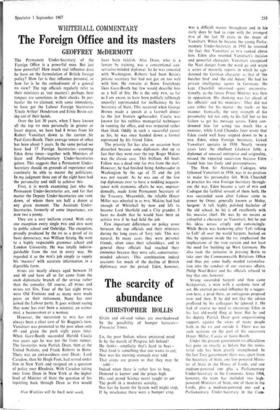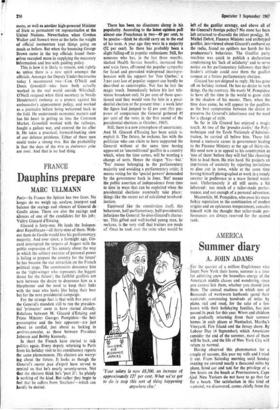The Foreign Office and its masters
WHITEHALL COMMENTARY GEOFFREY McDERMOTT
The Permanent Under-Secretary of the Foreign Office is a powerful man. But just how powerful? How much real influence does
he have on the formulation of British foreign policy? How far is that influence personal, or how far is he the embodiment of a general FO view? The top officials regularly refer to their ministers as 'our masters'; perhaps their
tongues are sometimes in their cheeks. In par- ticular the Po claimed, with some immodesty, to have got the Labour Foreign Secretaries `Uncle Arthur' Henderson and Ernie Bevin eat- ing out of their hands.
Over the last 30 years, when I have known all the top FO men personally in greater or
lesser degree, we have had 8 Puses from Sir Robert Vansittart down to the current .Sir Paul Gore-Booth. Their average tenure of office has been about 5 years. In the same period we have had 17 Foreign Secretaries—counting Eden three times—together with Ministers of State and Parliamentary Under-Secretaries galore. This suggests that a Permanent Under- Secretary should on grounds of experience and continuity be able to master the politicians. In my judgment three out of the eight have had the personality and skill to achieve this.
First, it is worth examining just who the Permanent Under-Secretaries are, and for that matter the Deputy Under-Secretaries one rank down, of whom there are half a dozen at any given moment. The Assistant Under- Secretaries, formerly of some importance, are now two a penny.
They are a very uniform crowd. With only one exception every single Pus and DUS went
to public school and Oxbridge. The exception,
proudly produced by the FO as a proof of its basic democracy, was William Strang. He went
to a highly respectable grammar school and London University. He was totally indistin- guishable from the rest in every way. He regarded it as the Pus's job simply to supply his 'masters' with accurate information in a digestible form.
Puses are nearly always aged between 55 and 60 and have all so far come from the snob diplomatic branch of the service rather
than the consular. Of course, all PUSCS and rouses are Sirs. Four of the last eight PUSeS
were Old Etonians and as many were made peers on their retirement. None has ever joined the Labour party. It goes without saying that none has ever been a scientist, an econo- mist, a businessman or a woman.
However, the succession to PUS has not always been a clear case of Sir Buggins's turn. Vansittart was promoted to the post when only 49—and given the push eight years later. When Gore-Booth succeeded Harold Caccia two years ago he was not the front runner. The favourites were Patrick Dean, then at the United Nations, and Frank Roberts in Bonn. There was an awkwardness over Dean: Lord Caradon, then Sir Hugh Foot, had served under him in New York and resigned on a question of policy over Rhodesia. With Caradon taking over from. Dean in New -York at the-higher level of Minister of State the question of his reporting back through Dean as PUS would Alan Watkins will be back next week. have been ticklish. Also Dean, who is a lawyer by training, was a conventional con- servative-minded diplomat. So he. was consoled with Washington. Roberts had been Bevin's private secretary but had not got on too well with him. He remains at Bonn. Everybody likes Gore-Booth but few would describe him as a ball of fire. He is the only PUS, so far as I am aware, to have been publicly (although unjustly) reprimanded for inefficiency by his Secretary of State. This occurred when George Brown made a speech at a farewell dinner to the last Iranian ainbassador. Caccia was known for his ruthless managerial techniques in running the office, and was respected rather than liked. Oddly in such a successful career as his, he was once handed down a formal reprimand by his friend Eden.
'The priority list has also on occasion been disturbed because some diplomats shot up so fast that they went over the top. Roger Makins was the classic case. This brilliant All Souls Fellow was a dead snip for PUS from the start. However, he had finished being Ambassador in Washington by the age of 52 and the job was not vacant. As he was one of the few top diplomats ever to have a nodding acquain- tance with economic affairs he was, unprece- dentedly, made Joint Permanent Secretary of the Treasury. Meanwhile, the reliable Hoyer Millar was wheeled in as PUS. Makins had had enough of Whitehall by now and left to become Lord Sherfield and a City grandee. I have no doubt that he would have been an activist PUS if he had held the job.
Few important differences on policy arose between the top officials and their ministers during the long years of Tory rule. This was natural. In many cases they were personal friends, often since their schooldays; and in general these officials had reached their eminence because they were safe, conservative- minded advisers. This combination indeed accounts for much of the decline of British diplomacy over the period. Eden, however, was a difficult master throughout and in his early days he had to cope with the strongest pus of the last 50 years in the shape of Vansittart. When he became the young Parlia-
mentary Under-Secretary in 1931 he resented the fact that Vansittart as PUS ranked abtive
him. Eden also resented Vansittart's incisive and powerful character. Vansittart recognised the Nazi danger from the word go and wrote
a series of masterly reports in which he CQR- dem ned the German character as that of 'the butcher bird' and 'the old Adam.' He had his
private intelligence agents in Germany. Ho kept Churchill informed--quiet unconstitu- tionally, as the future Prime Minister was then in opposition. His thinking was far ahead of his officials' and his ministers'. They did not care either for his matter--the truth —or his manner. Ironically, the very strength of his
personality led not only to his fall but to his failure to get his message across. Eden con-
demned him for acting too much like a minister; while Lord Chandos later wrote that Eden could well have stepped down to be a
PUS. Eden, when Foreign Secretary, kicked
Vansittart upstairs in 1938. Nearly twenty years later the ebullient Gladwyn Jebb.. a diplomat of unusual enterprise and originality, missed the expected succession because Eden found him too lively and presumptuous.
The Hon. Sir Alexander Cadogan, who followed Vansittart in 1938, was in no position
to make his personality felt. With Churchill in practice his own Foreign Secretary through- out the war, Eden became a sort of PUS and
Cadogan the faithful servant of them both. He was succeeded soon after Labour came to power by Orme, generally known as Moley, Sargent. A tall, highly polished bachelor of the old school, he hit it off excellently with his massive chief. He was by no means as colourful a character as Vansittart, but he put his ideas across crisply and convincingly.
While Bevin was hankering after 'Left talking
to Left' all over the world Sargent, backed on this by opinion inside the FO, emphasised the
implications of the iron curtain and not least the need for building up West Germany. He also took the initiative in pressing Bevin to take over the Commonwealth Relations Office and thus put some badly needed rationalisa- tion into the conduct of our overseas affairs. Philip Noel-Baker and his officials refused to buy that one, however.
Strang succeeded Sargent and then came Kirkpatrick, a man with a sardonic turn of wit. He exerted personal influence by a sugges- tion here, a prod there, an outrageous proposal now and then. If he did not like the advice proffered by his colleagues he ignored it. He had of course no need to encourage Eden in his last old-world fling at Suez. But he and his deputy Patrick Dean gave unquestioning support, against the views of many people both in the ro and outside it. There was no such activism on the part of his successors Hoyer Millar, Caccia or Gore-Booth.
Under the present government Fp officialdom has gone on exactly as before but the minis- terial side has been greatly strengthened. In the last Tory government there was, apart from the Secretary of State, one low-powered Minis- ter of State in the House of Lords, and one medium-powered one plus a Parliamentary Under-Secretary in the Commons. Since 1964,
however, the team has included two high- powered Ministers of State, one of them in the Lords, plus a medium-powered one and a Parliamentary Under-Secretary in the Coro- mons, as well as another high-powered Minister of State as permanent UK representative at the United Nations. Nevertheless when Gordon Walker and Stewart were at the helm the weight of official momentum kept things going on much as before. But when the bouncing George Brown came in the top officials found them- selves occupied more in supplying the necessary Information and less with guiding policy.
This is how it is likely to remain, and rightly so unless there is a new spirit amongst the officials. Amongst the Deputy Under-Secretaries today I recommend two—Con O'Neill and Denis Greenhill—who have both actually worked in the real world outside Whitehall. O'Neill resigned when third secretary in Nevile Henderson's embassy as a protest against his ambassador's appeasement policy, and worked as a journalist before being welcomed back to the fold. He understands economic matters and has his heart in getting us into the Common Market. Greenhill worked with the railways, fought a gallant war, and entered the s'o after it. He takes a practical, forward-looking view of our defence problems. Either of these men could make a strong PUS. But the probability is that the days of the PUS as eminence grise are over. And that is no bad thing.































 Previous page
Previous page